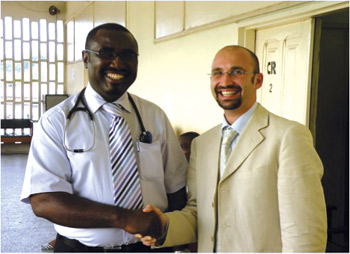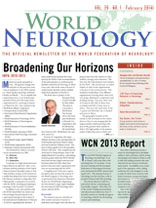
Organizers of the neurology training: Albert Akpalu (left), Korle Bu Teaching Hospital in Accra, Ghana, and Roberto Cilia, Parkinson Institute, Milan, Italy.
This course was jointly funded by the Movement Disorder Society (MDS) and the World Federation of Neurology. Additional co-sponsors were the Fondazione Grigioni per il Morbo di Parkinson (Italy) and the Society of Worldwide Medical Exchange (U.S.). This was the first neurology course designed for medical doctors who are not specialized in neurology. It was also open to neurologists interested in training in the field of movement disorders and dementia.
Participants were invited from throughout West Africa. Thirty-six participants attended the course, from Ghana (24), Nigeria (6), Sierra Leone (3), Gambia (2), and Cameroon (1).
The international faculty consisted of 16 international and local members, including neurologists, geriatricians, nurse specialists, a neuropsychologist, a physiotherapist, a nutrition specialist and a general practitioner from rural Ghana. The opening ceremony included guests such as the representative of the Minister of Health and of the nursing system in Ghana, the Italian Ambassador in Ghana, the chairman of Internal Medicine Department of the Teaching Hospital in Accra.
The course was run in English and included slide presentations and practical sessions with assessment of patients. Slide sessions focused on Parkinson’s disease (PD), dementia and other neurodegenerative disorders, covering epidemiology, diagnosis, pharmacological and non-pharmacological therapy. For the practical sessions with patients, participants were divided into small groups of five to six each, under the guidance of a faculty member, aiming to teach how to perform a neurological examination, neuropsychological scales screening for global and frontal-lobe cognitive functions and examples of physical therapy focused on gait and balance. Twelve patients attended these sessions, including PD, Lewy body dementia, Alzheimer’s disease and spino-cerebellar ataxia. In a session titled Bring Your Own Patient,” participants presented a patient from their own clinic and discussed with faculties the most relevant diagnostic and management challenges.
There were joint sessions with the PD Nurse Specialist Course, organized by Richard Walker (chair of the MDS Task Force on Africa).
Doctors and nurses had the opportunity to interact and share experiences about caring for patients. In particular, we included a Beyond the Neurologist session, dealing with the importance of a multidisciplinary approach to patients, especially in settings where medications are limited.
Educational material has been prepared and released for this course, including basic information about motor and non-motor features of PD and/or dementia. These booklets were drafted by different health care professionals (nurses, nutrition specialist, physiotherapists, neuropsychologists) and were full of pictures and photographs to be suitable for patients and caregivers with low education.
The course was a great success and participants’ feedback was positive in large part due to the practical sessions with patients and the interactive sessions. Each participant was given a DVD including all the slide presentations of the course, the UPDRS and the cognitive screening scales, the two educational booklets and photographs of the course. An email list was created including all the participants as well as the Italian and Ghanaian faculty, to share information and help in challenges of everyday clinical practice.
One of our aims was to make this course an opportunity to boost the education in the field of neurodegenerative disorders in developing countries. We promoted two initiatives:
- The entire course was professionally videotaped to make it available online.
- We provided two travel grants for the MDS events in 2014, the International Congress in Stockholm and the MDS summer school.
Course Organizers
Roberto Cilia (Italy)
roberto.cilia@gmail.com; roberto.cilia@icp.mi.it
Albert Akpalu (Ghana)
a_akpalu@yahoo.com
